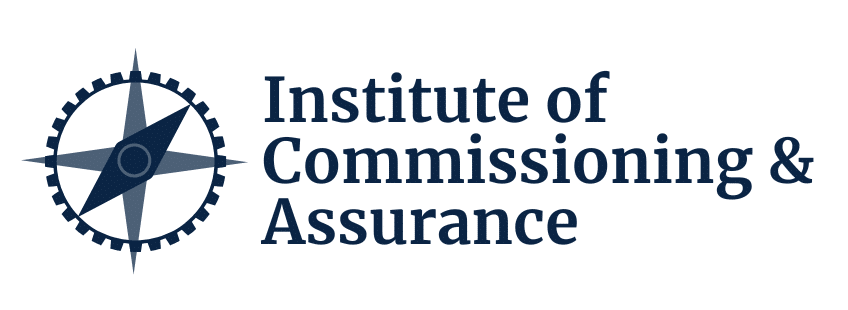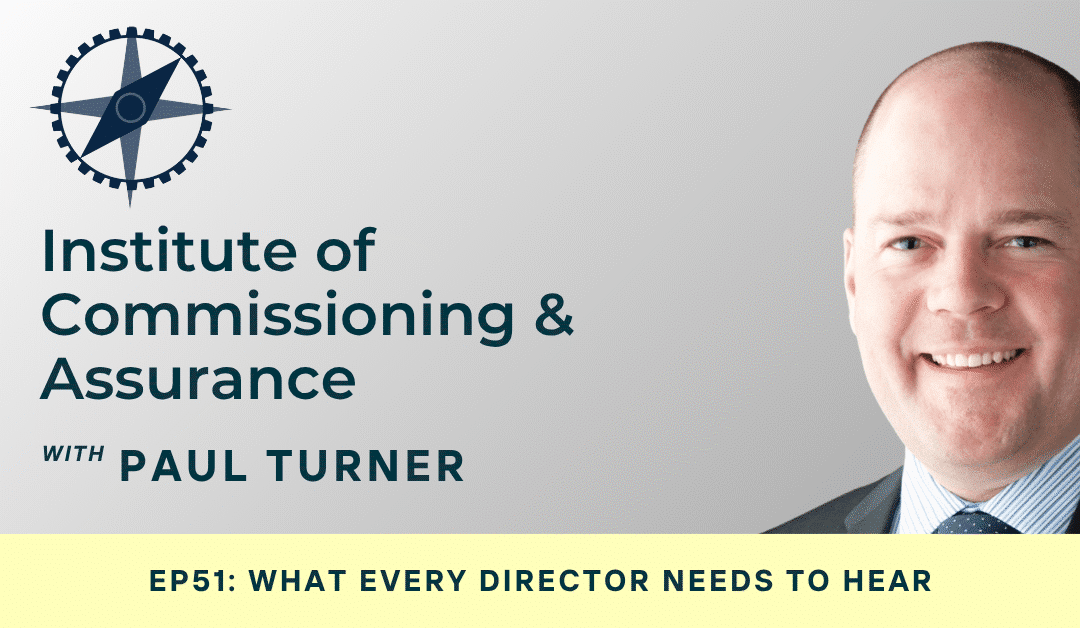I’m pleased to announce Darren Sangster as a new member of our ICxA Advisory Council. Darren brings decades of commissioning experience and his vast amount of information will be a huge contribution to ICxA’s initiatives. I had the pleasure of sitting down with Darren.
Hello everyone, welcome to the Institute of Commissioning and Assurance. I’m Paul Turner, Founder and CEO of ICxA, and despite some technical challenges and a power outage at a very inconvenient time, we’re here to introduce Darren Sangster as a new member of the ICxA Advisory Council.
Darren: Hey, thanks Paul. It’s great to be here. I hope this power outage isn’t an ominous sign for our show today.
Paul: I know, can you believe it? The electrical utility let us down at the most inconvenient time. They must need some additional commissioning support, but we’ll help them out if they need it. For anyone watching, if you’ve got questions or comments, shoot them in the chat, and we’ll address them at the end. This is a great opportunity to ask industry experts like Darren and get the help you need on your commissioning project. So, Darren, let’s start with your story. How did you first get into industrial operations, and what drew you into this fascinating world of startup?
Darren: It was a bit of a path, I’d say. When I got out of high school, I wasn’t clear on what I wanted to do. I tried real estate, got my pilot’s license, studied business at university, but none of them really resonated. By chance, I was in the gym one day talking to a guy about a refinery in my town. I’d always been fascinated by it—wondering what goes on in there, who works there. He mentioned process operators and power engineers, and that piqued my interest. I looked into it, pursued an education in high-pressure boiler operation, a regulated industry in Canada, and spent two years at it. I loved it—probably got some of my best marks ever. It was a nice mix of hands-on work and mental challenges like math and figuring out how things work. It filled a lot of niches for me.
Paul: That’s a great story of finding your calling. So how did you transition from operations to commissioning?
Darren: After starting at a dairy on Canada’s East Coast, I learned everything I could there. When I hit the end of that learning curve, I moved to Alberta where the oil sands were taking off. I worked in hazardous waste incineration, nickel production, hydrogen peroxide production—really interesting processes. But I found the initial learning phase, figuring out systems and interactions, was what kept me engaged. Day-to-day operations got a bit stale, so I moved around to keep learning. Then I heard about commissioning opportunities in northern Alberta’s Fort McMurray region. I didn’t know much about commissioning—thought it was just testing equipment—but I applied, got a job through a connection, and started as a low-level commissioning operator managing pump houses. I worked my way up, helping with the rest of the plant, getting into the control room, and starting up an 180 MW cogeneration unit. That was pretty cool.
Paul: That’s an incredible journey. You recently earned your PMP designation. What motivated you to apply project management principles to commissioning and strengthen your leadership?
Darren: Commissioning involves a lot of project management tools—building schedules, cost estimates, managing stakeholders, the iron triangle. You’re exposed to all this knowledge for free, essentially, by working on projects. Getting the PMP helped me speak the language of project managers, earning mutual respect and making interactions easier. When I looked into it, I had the experience from years on projects, so I studied, challenged it, and got it. It was beneficial, especially learning about quality aspects like statistics that I wasn’t as exposed to, tying things like Six Sigma into commissioning.
Paul: Absolutely, commissioning managers are in a prime position to bridge technical field work and project management. You’re big on mentoring junior team members. What advice do you give young professionals looking to get into commissioning and move forward in their careers?
Darren: I think about the great mentors I had, how they carried themselves, and why I respected them, and I try to emulate that. With many senior folks retiring, it’s critical to share knowledge. I tell young professionals to understand the “why” behind what we do—how tasks interconnect across the project. If you’re preparing pumps, know why they’re important to the system. Share the big picture with the team, even construction folks who may not know what the facility does. Help them see the value, like steam coming out of a smokestack for the first time. Answer questions, clarify expectations, and speak the languages of construction, operations, and project management. Commissioning is about bridging those gaps, so learn how engineering, construction, and operations interact to add value.
Paul: That’s spot-on. Commissioning folks are uniquely positioned to connect programmatic and execution levels. How would you describe commissioning leadership and why it matters so much to project success?
Darren: Commissioning leadership is the bridge—looking back to pull engineering and construction forward, looking ahead to pull operations back, tying it all together. It’s about making key decisions early, like setting good standards and managing data, which often get overlooked until it’s too late. It’s about sharing information, not siloing it, and helping other groups understand each other’s needs. When you take time to help others complete their tasks in the right order, it builds collaborative relationships, not adversarial ones. That’s where we get stuck—everyone’s focused on their own piece. By helping others, you selfishly help yourself achieve your goals and build trust across the project.
Paul: Well said. Can you share a story where commissioning made a critical difference in a project’s success?
Darren: On a large Alberta oil sands project with aggressive first oil dates, it was clear we were way behind. There were too many senior leaders—too many cooks in the kitchen—complicating decisions. The commissioning team started with small suggestions, showing how to simplify processes and create value. Over time, we built confidence, and leadership let commissioning drive this multi-billion-dollar project. Despite -40°C winters, insulation issues, and equipment freezing, we shaved months off, hitting first oil just 20 days late. We got more efficient with each train, going from 30 days to 26, then 24. The team’s grind and leadership’s trust made it happen. I got some gray hair, but it felt good.
Paul: Love that, especially battling Canadian winters. On the flip side, can you share an example where commissioning was undervalued, and what should leaders learn from that?
Darren: I’m supporting a project now where there were no standards, no real commissioning program. The organization treated it like an operating facility, not a project, and didn’t listen to early advice. It’s a mess now, and we’re trying to put processes in place to mitigate issues. If they’d taken advice upfront, we could’ve saved them a lot of trouble. Leaders need to involve commissioning early to influence decisions and avoid chaos at the end.
Paul: Those examples highlight the stakes. How do you see the commissioning manager role evolving over the next decade?
Darren: It’s going to be more critical, with more spotlight. Commissioning managers will be pulled into front-end planning, offering advice on what “good” looks like. Understanding project nuances—mechanical, electrical, controls, operations—will be key. Data and technology will be your biggest asset or liability. Good data plans early on will make commissioning leaders as sought-after as project managers, especially as retirements continue and AI reshapes things, though I don’t see it impacting field commissioning soon.
Paul: I agree, data and systems thinking are critical. What mindset or skills will the next generation of commissioning leaders need?
Darren: They need to be detail-oriented but flexible, knowing projects aren’t black-and-white. You might accept a system with a broken transmitter to keep moving, using handover exceptions. Own the handover process—define walkdowns, punch classifications, and documents clearly. ICxA’s templates are fantastic for this. Plan for real-world scenarios, like walkdowns taking days, and drive clarity in schedules. Take ownership of the outcome, align plans with stakeholders, and don’t assume someone else will handle it. That makes your life easier.
Paul: Absolutely, clear handovers remove ambiguity. You’re joining ICxA at a key time as we advance outcome assurance standards with governments and financers. Why was joining this movement important to you, and what do you hope to accomplish?
Darren: I got involved with the Commissioning Professional Society years ago for similar reasons—seeing the challenges in projects. ICXA took that to the next level with outcome assurance, a framework I think is the right path. With new developers tackling novel projects, they don’t know what good looks like. I want to help them make better upfront decisions, which helps everyone—commissioning, construction, project management. It’s self-serving but selfless. As I’m in my 50s, having done field execution, I want to help more people and magnify ICxA’s impact.
Paul: That’s powerful. How can outcome assurance change how project owners and executives think about success?
Darren: It’s about having a plan to complete. Define outcomes, set up engineering standards, document control, and a single source of truth for data. Avoid confusion where construction and commissioning databases don’t match. Clear division of responsibilities—who owns what, when—is key. Terms like “pre-commissioning” cause ambiguity; use clear terminology like “construction completion” or “static commissioning” so everyone knows who owns what. Asset information for operations readiness is critical too.
Paul: Terminology is like speaking a lawyer’s language—clarity is everything. If you’re advising a project director launching a $5 billion mega-project, what’s your single most important piece of advice?
Darren: Before committing that spend, ensure you and your stakeholders understand the project outcome and have a plan to complete it. If you don’t, there are people who can help.
Paul: Start with the end in mind. For young professionals wanting to get into commissioning, what’s your message to help them see themselves as future leaders, not just testers?
Darren: Start in operations or maintenance to understand equipment and asset strategies. Embrace the commissioning ride—it’s stressful but rewarding, with amazing, intelligent people and plenty of laughs. Be flexible; plans change, so anticipate pivots by listening in meetings and following up on nuances. Master your craft—mechanical, electrical, operations—to earn respect and influence. Learn how the plant interconnects, from pumps to control rooms to external pipelines. Ask questions, seek exposure to other project areas, and work your way up. Build a strong foundation to become a sophisticated leader, which the industry needs.
Paul: Great advice, Darren. We’re thrilled to have you on the ICxA Advisory Council. Where can people connect with you and learn about PX Group?
Darren: I’m easy to find on LinkedIn—just search Darren Sangster. For PX Group, visit pxlimited.com. We started as a UK operations and maintenance company 30 years ago and are now growing our commissioning and startup side, which complements operations nicely.
Paul: Thanks for sharing, Darren. For anyone watching, reach out to Darren on LinkedIn and visit icxa.net to learn how we’re working with leaders like Darren and PX Group to transform project outcomes. Have a great day, everyone!
Darren: Thanks, Paul. Thanks, everyone.
Are you ready to lead infrastructure projects with purpose and accountability? Join the movement at icxa.net and unlock exclusive resources, from global standards to project delivery reform and career development certification programs. Visit icxa.net for more information.


Recent Comments